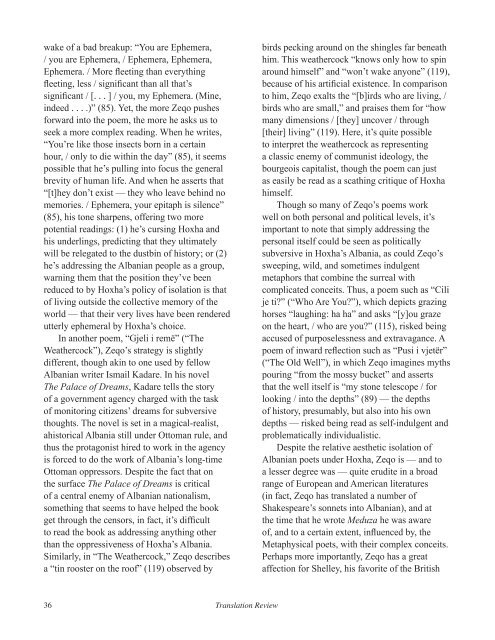Table of contents - The University of Texas at Dallas
Table of contents - The University of Texas at Dallas
Table of contents - The University of Texas at Dallas
You also want an ePaper? Increase the reach of your titles
YUMPU automatically turns print PDFs into web optimized ePapers that Google loves.
wake <strong>of</strong> a bad breakup: “You are Ephemera,<br />
/ you are Ephemera, / Ephemera, Ephemera,<br />
Ephemera. / More fleeting than everything<br />
fleeting, less / significant than all th<strong>at</strong>’s<br />
significant / [. . . ] / you, my Ephemera. (Mine,<br />
indeed . . . .)” (85). Yet, the more Zeqo pushes<br />
forward into the poem, the more he asks us to<br />
seek a more complex reading. When he writes,<br />
“You’re like those insects born in a certain<br />
hour, / only to die within the day” (85), it seems<br />
possible th<strong>at</strong> he’s pulling into focus the general<br />
brevity <strong>of</strong> human life. And when he asserts th<strong>at</strong><br />
“[t]hey don’t exist — they who leave behind no<br />
memories. / Ephemera, your epitaph is silence”<br />
(85), his tone sharpens, <strong>of</strong>fering two more<br />
potential readings: (1) he’s cursing Hoxha and<br />
his underlings, predicting th<strong>at</strong> they ultim<strong>at</strong>ely<br />
will be releg<strong>at</strong>ed to the dustbin <strong>of</strong> history; or (2)<br />
he’s addressing the Albanian people as a group,<br />
warning them th<strong>at</strong> the position they’ve been<br />
reduced to by Hoxha’s policy <strong>of</strong> isol<strong>at</strong>ion is th<strong>at</strong><br />
<strong>of</strong> living outside the collective memory <strong>of</strong> the<br />
world — th<strong>at</strong> their very lives have been rendered<br />
utterly ephemeral by Hoxha’s choice.<br />
In another poem, “Gjeli i remë” (“<strong>The</strong><br />
We<strong>at</strong>hercock”), Zeqo’s str<strong>at</strong>egy is slightly<br />
different, though akin to one used by fellow<br />
Albanian writer Ismail Kadare. In his novel<br />
<strong>The</strong> Palace <strong>of</strong> Dreams, Kadare tells the story<br />
<strong>of</strong> a government agency charged with the task<br />
<strong>of</strong> monitoring citizens’ dreams for subversive<br />
thoughts. <strong>The</strong> novel is set in a magical-realist,<br />
ahistorical Albania still under Ottoman rule, and<br />
thus the protagonist hired to work in the agency<br />
is forced to do the work <strong>of</strong> Albania’s long-time<br />
Ottoman oppressors. Despite the fact th<strong>at</strong> on<br />
the surface <strong>The</strong> Palace <strong>of</strong> Dreams is critical<br />
<strong>of</strong> a central enemy <strong>of</strong> Albanian n<strong>at</strong>ionalism,<br />
something th<strong>at</strong> seems to have helped the book<br />
get through the censors, in fact, it’s difficult<br />
to read the book as addressing anything other<br />
than the oppressiveness <strong>of</strong> Hoxha’s Albania.<br />
Similarly, in “<strong>The</strong> We<strong>at</strong>hercock,” Zeqo describes<br />
a “tin rooster on the ro<strong>of</strong>” (119) observed by<br />
birds pecking around on the shingles far bene<strong>at</strong>h<br />
him. This we<strong>at</strong>hercock “knows only how to spin<br />
around himself” and “won’t wake anyone” (119),<br />
because <strong>of</strong> his artificial existence. In comparison<br />
to him, Zeqo exalts the “[b]irds who are living, /<br />
birds who are small,” and praises them for “how<br />
many dimensions / [they] uncover / through<br />
[their] living” (119). Here, it’s quite possible<br />
to interpret the we<strong>at</strong>hercock as representing<br />
a classic enemy <strong>of</strong> communist ideology, the<br />
bourgeois capitalist, though the poem can just<br />
as easily be read as a sc<strong>at</strong>hing critique <strong>of</strong> Hoxha<br />
himself.<br />
Though so many <strong>of</strong> Zeqo’s poems work<br />
well on both personal and political levels, it’s<br />
important to note th<strong>at</strong> simply addressing the<br />
personal itself could be seen as politically<br />
subversive in Hoxha’s Albania, as could Zeqo’s<br />
sweeping, wild, and sometimes indulgent<br />
metaphors th<strong>at</strong> combine the surreal with<br />
complic<strong>at</strong>ed conceits. Thus, a poem such as “Cili<br />
je ti” (“Who Are You”), which depicts grazing<br />
horses “laughing: ha ha” and asks “[y]ou graze<br />
on the heart, / who are you” (115), risked being<br />
accused <strong>of</strong> purposelessness and extravagance. A<br />
poem <strong>of</strong> inward reflection such as “Pusi i vjetër”<br />
(“<strong>The</strong> Old Well”), in which Zeqo imagines myths<br />
pouring “from the mossy bucket” and asserts<br />
th<strong>at</strong> the well itself is “my stone telescope / for<br />
looking / into the depths” (89) — the depths<br />
<strong>of</strong> history, presumably, but also into his own<br />
depths — risked being read as self-indulgent and<br />
problem<strong>at</strong>ically individualistic.<br />
Despite the rel<strong>at</strong>ive aesthetic isol<strong>at</strong>ion <strong>of</strong><br />
Albanian poets under Hoxha, Zeqo is — and to<br />
a lesser degree was — quite erudite in a broad<br />
range <strong>of</strong> European and American liter<strong>at</strong>ures<br />
(in fact, Zeqo has transl<strong>at</strong>ed a number <strong>of</strong><br />
Shakespeare’s sonnets into Albanian), and <strong>at</strong><br />
the time th<strong>at</strong> he wrote Meduza he was aware<br />
<strong>of</strong>, and to a certain extent, influenced by, the<br />
Metaphysical poets, with their complex conceits.<br />
Perhaps more importantly, Zeqo has a gre<strong>at</strong><br />
affection for Shelley, his favorite <strong>of</strong> the British<br />
36 Transl<strong>at</strong>ion Review

















